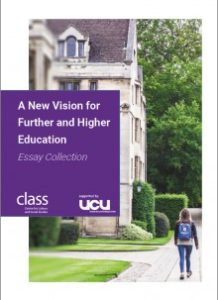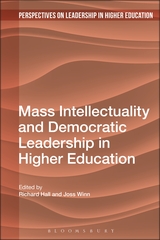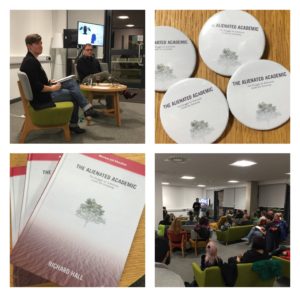In other, exciting news, I have agreed with Mayfly books, based in Leicester, to produce a new monograph on academic life. Mayfly are extending their work on critical university studies, and have also published Ansgar Allen’s The Cynical Educator and Toni Ruuska’s Capitalism, Higher Education and Ecological Crisis. Mayfly also publishes the journal ephemera: theory and politics in organization.
Working with Mayfly is important because I am particularly interested in supporting radical publishing houses that are open, or that resist the subsumption of academic work by corporate publishers. Transparent, democratic engagement is very important to me, and in my role is something I can help celebrate and support. It is why I have been a trustee of the Open Library of Humanities.
Anyway, the book has the working title:
The hopeless university: intellectual work at the end of the end of history
The book will integrate some thinking I have been doing since the publication of The Alienated Academic. I guess its starting point is that I want to tell my story beginning from the last story I told. So, it continues to develop some of the common themes I play around with, including: hopelessness and helplessness inside the University; University as an anxiety machine; the almost overwhelming sense of Weltschmerz felt inside educational institutions; the University predicated upon alienated academic labour-power; and, the University as an abject space, unable to engage meaningfully with crises of social reproduction. It asks whether it is possible to refuse the University as is, as a trans-historical space that can only exist for capital?
I want to think through the re-emergence of engagement with ideas of hope, and their relationship to progressive politics and horizons of educational possibility. In part, I do this because I believe the current situation to be hopeless. I have written about this here. Or you could also read the chapter on Weltschmerz in The Alienated Academic. Or check out some of my other writing here.
So, the structure will focus upon: terrains of hopelessness; hopeless struggle; forms and structures of hopelessness; cultures and pathologies of hopelessness; practices and methodologies of hopelessness; hopeful despair; and the potential for hope at the end of the end of history.
I have shamelessly stolen the idea of the end of the end of history from the guys at Aufhebungabunga: The global politics podcast at the end of the End of History. From a left perspective. The idea of the end of the end of history exposes the fraud at the heart of narratives of the end of history, and of the inevitable, timeless, transhistorical victory of capitalism. This is a narrative generated from a North Atlantic context, which lays out space-time as a capitalist entity, and forecloses on all possible historical, material futures. No new history of struggle or resistance can emerge, precisely because all such struggles and resistances are subsumed as Capital, and its institutions re-purpose all of social life in the name of value, production, profit and surplus. In this subsumption of social life, the University is a critical node precisely because it provides a constant funnelling of individuals into a normalised existence framed by debt and work. In this way, it is hopeless to imagine any other form of historical and material existence beyond the freedom offered through an individual’s sale of labour power in the free market. Beyond the institutions of capitalist society, life has limited meaning.
Yet, in analysing the place of the University at the end of history, we note that it is situated inside a terrain of global, socio-economic and socio-environmental crises, which have been amplified during the ongoing secular crisis of capitalism. Once more, capitalism as a means of social organisation is under threat from ruptures both inside and outside of work, grounded in intersectional, temporal and geographical injustices that erupt from points of labour and points where labour touches society. A range of indigenous resistances, struggles grounded in race, gender, disability and class, emergent revolts against toxic ecological policies, resistance to economic and political populism, each place the institutions of capital in stark opposition to the everyday, lived experiences of individuals and communities struggling for life. The historical and material realities of existence, of social reproduction, of struggle, have returned with a vengeance.
So, the plan for the book is predicated upon the following precepts. This is its current direction of travel. Although I have some Hegel and Marcuse to read first, alongside a bunch of stuff on rage, courage, justice, faith, and solidarity movements that are indigenous, identity-driven and intersectional. I have to revisit some stuff on hope too…
- The University has become a place that has no socially-useful role beyond the reproduction of capital, and has become an anti-human project devoid of hope. It projects and protects a condition that is irredeemable. It is hopeless in all senses, and this reflects its inability to respond meaningfully with crises that erupt from the contradictions of capital, including that between capital and climate. Yet in its maintenance of business-as-usual, the University remains shaped as a tactical response to these contradictions.
- The book describes and analyses this position against the terrain of higher education (HE) in the global North. It does so in relation to the ways in which the University has been re-engineered in relation to the law of value. This process of subsumption situates the University inside a transnational geography of accumulation. This changes the very idea of the University, and what it means to work inside the Academy, such that they are emptied of political, democratic content, and instead reorganised around surplus. The University has become a key site for reproducing the separation of polity and economy.
- The fixation on surplus, efficiency, enterprise, excellence, impact, and so on reinforces a turn away from intellectual practice as a use-value for individuals, such that it has a focus upon the creation of commodities that have exchange-value. This relentless process can only be met by hopeless struggles inside the University, or a retreat into helplessness by academics and students, in the face of authoritarian performance management.
- These hopeless struggles are analysed in terms of: first, forms of hopelessness imposed by institutional structures: second, the diseased, pathological hopelessness that the University represents through its normalisation of cultures of ill-being, overwork and privilege; and third, the methodological, process-based hopelessness engendered by everyday academic practices that are enforced by toxic managerialism.
- Emerging from an analysis of the intersection of these forms, pathologies and methodologies of hopelessness is a moment of hopeful despair, grounded in the ability of labour to awaken to its predicament both inside a crisis-driven institution, and at the level of society. In this way, the book calls for the dissolution, dismantling or detonation of institutions that engender hopelessness and helplessness, including the University.
- The book closes with a discussion of the idea of hope, and its intersection with institutions of formal HE or informal higher learning, at the end of the end of history. The realisation of the impossibility of recovering stable forms of capitalist accumulation, the collapse of socio-environmental systems, widespread forms and structures of inequality and inequity, and the rise of political and economic populism, have foreclosed upon our collective inability to imagine that another world is possible. We are no longer living at the end of history. Rather we need to imagine the idea of the intellectual work at the end of the end of history.
- Therefore, the book addresses the following questions. How have we been betrayed by the University? In this sense, what is the University not capable of becoming, being, knowing and doing? Can mapping the University as an anxious, abject, hopeless space, distorted and exploited by Capital, enable us to define a counter-cartography? Is another education possible?


